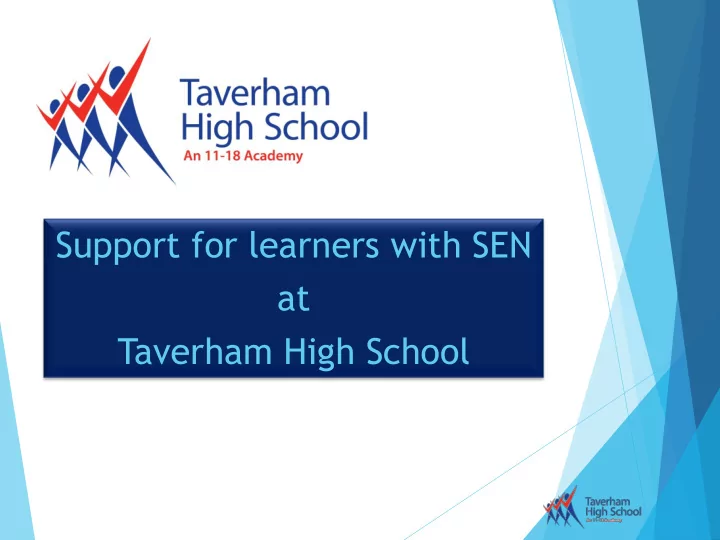

Support for learners with SEN at Taverham High School
Aims National picture: guidance and funding Graduated response SEN at Taverham High School Allocation of support & the role of LSAs Exam Access Arrangements Support for parents
Regulations & Guidance
SEND Code of Practice SEN, D or SEND: 6.8 Curriculum: 6.12 Identification of SEN 6.15 Four broad areas of need 6.28 Special educational provision 6.36 Graduated response Working with learners and their families
SEN Funding Government provides funds to Local Authorities Local Authorities provide funds to Schools In Norfolk: Out of county (non-maintained) specialist settings Complex needs & specialist (maintained) schools: budget School budgets: Notional funding for SEN High level SEN exceptional needs funding EHCP SEN Support
Graduated Response Assess Assess Assess Plan Plan Plan SEN HQT EHCP Support Do Do Do Review Review Review Progress over time & level of need
Support for learners Communication with school staff Chosen according to the needs of the individual Environmental factors Equipment Strategies Intervention groups Small group learning In class support
Student Support Plan
The Team SENCO: Rebecca Dixon Assistant SENCO: Pauline Phillipson LEAD LSAs Cognition & Learning: LSAs Jo Gray Maya Booty Social, Emotional & Mental Health: KAVE Jennie Child Natasha Vincent-Waterson Lead teacher: Sue Childs Communication & Sarah O’Neill Martin Newson Interaction: KAVE Teacher: Mel Smith Caryl Ainsworth Chris Abel Sue Stansfield Physical disability & Haley Wiseman sensory impairment: Julie Winn Assessment Coordinator: Nicola Sheard
Allocation of support What is the need? What is the barrier to learning? What does the learner need? How can we best equip learner to be independent? Consideration of subject demands Consideration of environmental factors Views of the learner, parents, LSAs and teachers Advice from external professionals
Exam Access Arrangements (EAA) Regulated by JCQ Annual assessor training - certified Specific assessments with strict criteria / cut-off points Additional time, reader, scribe Technology
Role of LSA Generally the LSA is… NOT ‘Velcro’ NOT task completion NOT ‘one to one’ or constant carer role Developing skills for learning Transferring skills to class Developing independence Supporting well-being
Support for parents Form tutors Subject teachers Receptionist Pastoral team: Head of year, Head of key stage, ACE SEN team Norfolk SEND Partnership (01603 704070) www.norfolksendpartnershipiass.org.uk EHCP Co-ordinator, Kim Fitchett-Smith
Support for parents What else would be helpful? drop-in surgery SEN café
SEND Information Report Please sign up! Name Parent of… Telephone E-mail
Thank you
Questions
Code of Practice for SEND : Highlights Context: 6.1 – 6.7 All children are entitled to an appropriate education SEN, D or SEND: 6.8 – 6.11 Equality Act 2010 Reasonable adjustments (anticipatory) Supporting pupils at school with medical conditions 2014 Curriculum: 6.12 Set high expectations Set targets which are deliberately ambitious Plan lessons to address potential areas of difficulty and to remove barriers to achievement
Code of Practice for SEND : Highlights Identification of SEN What is SEN? 6.15 Process starts with the teachers 6.17 High quality teaching 6.19 Involving parents 6.20 Four broad areas of need 6.28 – 6.35 Cognition and learning (C&L) Communication and Interaction (C&I) Social, emotional and mental health difficulties (SEMH) Sensory and/or physical needs (PD/sensory)
Code of Practice for SEND : Highlights Special educational provision Teachers and teaching 6.36 – 6.37 Graduated response Assess, plan, do, review Forms basis of school’s processes for meeting SEN Quality first teaching – SEN support – EHCP Working with learners and their families Recurring theme Detail of duties 6.64 – 6.71
Recommend
More recommend